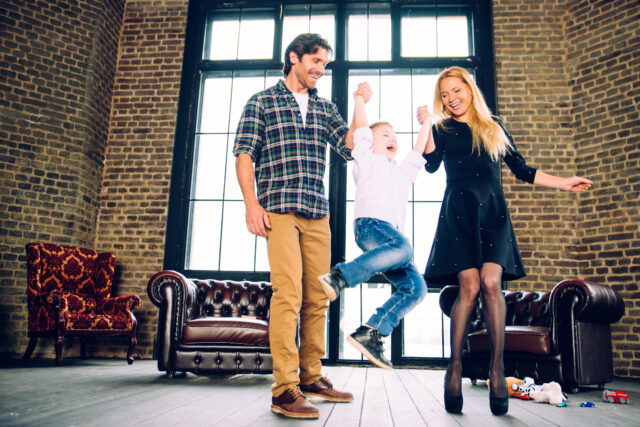As adults, it’s easy to look back on our childhoods through a more objective lens. Emotions aren’t running quite as high as they were when certain experiences or situations were still fresh in our minds (and present in our lives), so we can actually question whether or not growing up was as great as everyone in the family seems to remember it being for you. However, if you relate to any of the following, you can rest assured you had it pretty good.
1. You have a solid group of friends from way back when.

You know, the kind of friends who’ve seen you at your absolute worst (think questionable fashion choices and embarrassing teenage phases) and still love you unconditionally. These are the people you can call at 2 a.m. to rant about your day, or just to share a silly meme. If you’ve got this kind of ride-or-die crew, cherish them. It’s a testament to the strong foundation you built during your formative years.
2. You’re not afraid to be a little goofy.
 Source: Pexels
Source: Pexels Remember those impromptu dance parties in the living room or building forts with blankets and pillows? If you still find joy in those simple pleasures and aren’t afraid to let your inner child run wild, it’s a sign you had a childhood that encouraged creativity and self-expression. Life’s too short to take yourself too seriously, so go ahead and belt out that cheesy song or have a pillow fight with your best friend.
3. You have a strong sense of self-worth.
 Source: Unsplash
Source: Unsplash Maybe you’re not the CEO of a Fortune 500 company or a world-famous celebrity, and that’s okay. If you feel good about who you are, your accomplishments, and your place in the world, it suggests you were raised in an environment that fostered self-esteem and confidence. Remember, true success isn’t measured by external validation but by how you feel about yourself.
4. You value experiences over material possessions.
 Source: Unsplash
Source: Unsplash Sure, we all like nice things, but if you find yourself prioritizing experiences like traveling, concerts, or trying new foods over the latest gadgets or designer clothes, it’s a sign you were raised to appreciate the value of memories and personal growth. These experiences enrich our lives and shape who we are, far more than any material possession ever could.
5. You’re not afraid to ask for help when you need it.
 Source: Unsplash
Source: Unsplash Whether it’s reaching out to a friend for emotional support or seeking professional help for a mental health issue, being able to ask for help is a sign of strength, not weakness. If you learned this valuable lesson early on, it’s likely because you had a supportive network of family and friends who taught you that it’s okay to not have all the answers.
6. You have a healthy relationship with food and your body.
 Source: Unsplash
Source: Unsplash If you enjoy a variety of foods without guilt or restriction and feel comfortable in your own skin, it’s a positive sign. This indicates you were raised in an environment that prioritized healthy eating habits and body image, without focusing on unrealistic beauty standards or fad diets. Remember, food is meant to be enjoyed, and your body is a vessel that deserves love and respect, regardless of its shape or size.
7. You’re able to forgive yourself and others.
 Source: Pexels
Source: Pexels We all make mistakes, and holding onto grudges only hurts us in the long run. If you’re able to forgive yourself for past mistakes and let go of resentment towards others, it’s a sign of emotional maturity and a healthy upbringing. Forgiving doesn’t mean forgetting or condoning harmful behavior, but it allows you to move forward and free yourself from the burden of anger and bitterness.
8. You have a strong sense of empathy and compassion for others.
 Source: Pexels
Source: Pexels If you find yourself genuinely caring about the well-being of others, celebrating their successes, and offering support during difficult times, it’s a reflection of a childhood that nurtured empathy and kindness. You likely had role models who taught you the importance of putting yourself in someone else’s shoes and treating others with respect and compassion. Remember, the world could always use more kindness, so keep spreading the love.
9. You’re comfortable setting boundaries and saying “no.”
 Source: Unsplash
Source: Unsplash Remember that time you finally mustered up the courage to say “no” to that extra project at work or politely declined an invitation to a party you didn’t really want to attend? If you’re able to prioritize your own needs and well-being without feeling guilty or obligated to please others, it’s a sign you were raised in an environment that respected your autonomy and taught you the importance of self-care. It’s okay to say “no” sometimes, and it doesn’t make you a bad person.
10. You’re able to adapt to change and embrace new experiences.
 Source: Unsplash
Source: Unsplash Life is full of unexpected twists and turns, and if you’re able to roll with the punches and adapt to new situations, it’s a testament to your resilience and adaptability. This valuable skill is often developed during childhood, as we learn to navigate the ups and downs of family life, school, and social circles. Remember, change is inevitable, but it can also lead to exciting new opportunities and personal growth.
11. You have a healthy balance between work and play.

While it’s important to be responsible and dedicated to your career or studies, it’s equally important to make time for fun and relaxation. If you’re able to prioritize both work and play without feeling guilty or overwhelmed, it suggests you were raised in an environment that valued balance and encouraged you to pursue your passions and interests. Remember, all work and no play makes Jack a dull boy (or Jill a dull girl), so don’t forget to schedule some downtime and have fun!
12. You have a positive outlook on life and believe in the power of hope.
 Source: Unsplash
Source: Unsplash Even when faced with challenges or setbacks, you maintain a positive attitude and believe that things will eventually get better. This optimism is often rooted in childhood experiences that taught you the importance of resilience, perseverance, and the power of hope. It’s important to remember that even the darkest clouds have a silver lining, and there’s always something to be grateful for, no matter how difficult the situation may seem.
13. You value honesty and integrity in yourself and others.
 Source: Unsplash
Source: Unsplash If you strive to be truthful and ethical in your interactions with others and expect the same in return, it’s a sign you were raised with strong moral values. Honesty and integrity are essential building blocks for healthy relationships and a fulfilling life. Remember, your word is your bond, and being true to yourself and others is always the best policy, even when it’s difficult.
14. You’re able to express your emotions in a healthy way.
 Source: Unsplash
Source: Unsplash Whether it’s through talking to a friend, writing in a journal, or engaging in creative activities, you’re able to identify and express your emotions without bottling them up or resorting to unhealthy coping mechanisms. This emotional intelligence is often developed during childhood, as we learn to understand and manage our feelings in a safe and supportive environment. Remember, it’s okay to not be okay, and expressing your emotions is a sign of strength, not weakness.
15. You’re open-minded and willing to learn from others.
 Source: Pexels
Source: Pexels You’re not afraid to challenge your own beliefs or consider different perspectives, and you actively seek out opportunities to learn and grow from others. This open-mindedness is often fostered during childhood, as we interact with people from different backgrounds and cultures. It’s important to remember that we can always learn something new, and being open to different viewpoints can enrich our lives and broaden our understanding of the world.
16. You’re grateful for the little things in life.
 Source: Unsplash
Source: Unsplash You appreciate the simple joys of a sunny day, a good cup of coffee, or a warm hug from a loved one. This gratitude for the everyday moments is often cultivated during childhood, as we learn to appreciate the small but meaningful things that make life worth living. Remember, happiness isn’t about grand gestures or extravagant possessions, but about finding joy in the present moment and appreciating the little things that make life so special.




